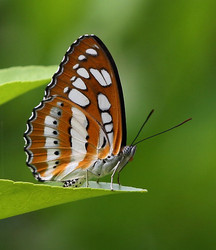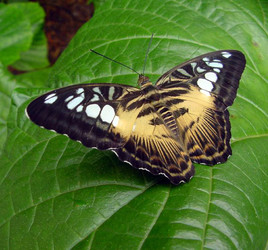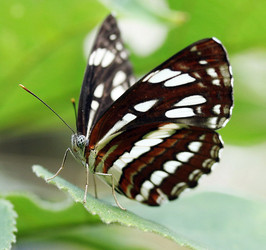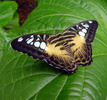Limenitidinae
Niklas Wahlberg and Andrew V. Z. Brower


This tree diagram shows the relationships between several groups of organisms.
The root of the current tree connects the organisms featured in this tree to their containing group and the rest of the Tree of Life. The basal branching point in the tree represents the ancestor of the other groups in the tree. This ancestor diversified over time into several descendent subgroups, which are represented as internal nodes and terminal taxa to the right.

You can click on the root to travel down the Tree of Life all the way to the root of all Life, and you can click on the names of descendent subgroups to travel up the Tree of Life all the way to individual species.
For more information on ToL tree formatting, please see Interpreting the Tree or Classification. To learn more about phylogenetic trees, please visit our Phylogenetic Biology pages.
close boxIntroduction
Traditional "Limenitidinae" of authors (e. g., Harvery 1991) was a paraphyletic group composed of multiple clades: Biblidini, Cyrestini, Pseudergolini, Coloburini, and Limenitidini. The latter tribe, which is the sister group of Heliconiinae, is here considered to be the "true" Limenitidinae. The rest are more closeley-related to Apaturinae and Nymphalinae (or part of Nymphalinae, in the case of Coloburini).
References
Brower AVZ. 2000. Phylogenetic relationships among the Nymphalidae (Lepidoptera) inferred from partial sequences of the wingless gene. Proc. R. Soc. Lond. B 267: 1201-1211.
Harvey DJ. 1991. Higher classification of the Nymphalidae. In: Nijhout HF, ed. The Development and Evolution of Butterfly Wing Patterns. Washington D. C.: Smithsonian Institution Press. 255-273.
Wahlberg N, Braby MF, Brower AVZ, de Jong R, Lee M-M, Nylin S, Pierce NE, Sperling FAH, Vila R, Warren AD, and Zakharov E. 2005. Synergistic effects of combining morphological and molecular data in resolving the phylogeny of butterflies and skippers. Proc. R. Soc. Lond. B 272: 1577-1586.
Wahlberg N, Weingartner E, and Nylin S. 2003. Towards a better understanding of the higher systematics of Nymphalidae (Lepidoptera: Papilionoidea). Mol. Phylogenet. Evol. 28: 473-484.
Title Illustrations

| Scientific Name | Athyma perius |
|---|---|
| Location | Taiwan |
| Specimen Condition | Live Specimen |
| Source | IMG_1642asj1 |
| Source Collection | Flickr |
| Image Use |
 This media file is licensed under the Creative Commons Attribution-NonCommercial-NoDerivs License - Version 2.0. This media file is licensed under the Creative Commons Attribution-NonCommercial-NoDerivs License - Version 2.0.
|
| Copyright | © 2006 leemt2 |
| Scientific Name | Parthenos sylvia |
|---|---|
| Specimen Condition | Live Specimen |
| Source | Parthenos sylvia |
| Source Collection | Flickr |
| Image Use |
 This media file is licensed under the Creative Commons Attribution-NonCommercial License - Version 2.0. This media file is licensed under the Creative Commons Attribution-NonCommercial License - Version 2.0.
|
| Copyright | © 2002 Wes Kalinowski |
| Scientific Name | Neptis hylas luculenta |
|---|---|
| Location | Taiwan |
| Specimen Condition | Live Specimen |
| Source | Neptis hylas luculenta _2 |
| Source Collection | Flickr |
| Image Use |
 This media file is licensed under the Creative Commons Attribution-NonCommercial-NoDerivs License - Version 2.0. This media file is licensed under the Creative Commons Attribution-NonCommercial-NoDerivs License - Version 2.0.
|
| Copyright | © 2006 leemt2 |
About This Page
Niklas Wahlberg

University of Turku, Finland
Andrew V. Z. Brower

Middle Tennessee State University, Murfreesboro, Tennessee, USA
Correspondence regarding this page should be directed to Niklas Wahlberg at
niklas.wahlberg@utu.fi
and Andrew V. Z. Brower at
abrower@mtsu.edu
Page copyright © 2009 Niklas Wahlberg and Andrew V. Z. Brower
 Page: Tree of Life
Limenitidinae .
Authored by
Niklas Wahlberg and Andrew V. Z. Brower.
The TEXT of this page is licensed under the
Creative Commons Attribution License - Version 3.0. Note that images and other media
featured on this page are each governed by their own license, and they may or may not be available
for reuse. Click on an image or a media link to access the media data window, which provides the
relevant licensing information. For the general terms and conditions of ToL material reuse and
redistribution, please see the Tree of Life Copyright
Policies.
Page: Tree of Life
Limenitidinae .
Authored by
Niklas Wahlberg and Andrew V. Z. Brower.
The TEXT of this page is licensed under the
Creative Commons Attribution License - Version 3.0. Note that images and other media
featured on this page are each governed by their own license, and they may or may not be available
for reuse. Click on an image or a media link to access the media data window, which provides the
relevant licensing information. For the general terms and conditions of ToL material reuse and
redistribution, please see the Tree of Life Copyright
Policies.
- First online 25 September 2006
- Content changed 15 January 2007
Citing this page:
Wahlberg, Niklas and Andrew V. Z. Brower. 2007. Limenitidinae . Version 15 January 2007 (under construction). http://tolweb.org/Limenitidinae/12196/2007.01.15 in The Tree of Life Web Project, http://tolweb.org/











 Go to quick links
Go to quick search
Go to navigation for this section of the ToL site
Go to detailed links for the ToL site
Go to quick links
Go to quick search
Go to navigation for this section of the ToL site
Go to detailed links for the ToL site